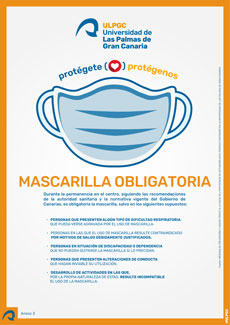General Protocols
In this space you will find the summary of the COVID-19 prevention measures in the ULPGC updated for this academic year 2021-2022.
- Prevention, hygiene and health promotion measures against covid-19 for university centres in the academic year 2021-2022 [Updated 16 July 2021] from the Ministries of Health and Universities.
- Strategy for Early Detection, Surveillance and Control of COVID-19. Ministry of Health [Updated 12 August 2021].
- Strategy for the early detection, surveillance and control of COVID-19. General Directorate of Public Health. Government of the Canary Islands [Updated 18 March 2021].
- Guide for action in the event of the appearance of cases of COVID-19 in educational centres. Ministry of Health. [Updated 14 April 2021].
- Procedure for occupational risk prevention services in the event of exposure to SARS-CoV-2. Ministry of Health. [Updated 16 July 2021].
AIMING FOR THE MAXIMUM POSSIBLE PRESENCE
The ULPGC foresees that the activity in the centres and faculties will be carried out with the maximum possible presence, regardless of the level of alert, from the beginning of the academic year 2021-2022.
In cases of very high alert levels (current levels 3 and 4, or equivalent levels that may be defined in the future), hybrid training may be promoted in order to reduce mobility, crowding and capacity.
LIMITING CONTACTS AND MAINTAINING INTERPERSONAL DISTANCE
- In normal conditions and alert levels 1 and 2, a normal distance of no less than 50 cm should be maintained between people in the centre’s spaces.
- At alert levels 3 and 4, a distance of at least 1.2 metres should be maintained between people in university centre spaces.
- Avoid prolonged stays in transit areas or common spaces and respect existing organisational measures in the centres (differentiated access to entrances and exits, use of staggered timetables, signage in corridors or infographics).
- In teaching activities (classrooms and laboratories) maintain stable groups and always occupy the same seat in order to facilitate the detection of potential contagion.
RESPECTING PERSONAL PREVENTION MEASURES AGAINST COVID-19 AND OTHER RESPIRATORY INFECTIONS:
– MANDATORY AND CORRECT USE OF THE MASK
- It must cover the nose and chin.
- It must be tightly fitted to the face.
During your stay at the university you must wear a mask. The use of a hygienic mask, if possible reusable, is recommended for students, teaching staff and administrative staff.
In alert situations 3 and 4, students, teaching and research staff and administrative and service staff who participate in the on-site activity and request it will be given two FFP2 masks without valve in their centres.
See posters: poster 2 and poster 3

In general, the obligation to wear a mask will not be applicable in the following cases:
- Persons who present some type of respiratory difficulty that may be aggravated by the use of a mask.
- Persons for whom the use of a mask is contraindicated for duly justified health reasons.
- Persons in a situation of disability or dependence who cannot remove the mask if they need to do so.
- Persons with behavioural alterations that make its use unfeasible.
- Carrying out activities in which, by their very nature, the use of the mask is incompatible.
– PROMOTING A SMOKE-FREE CAMPUS, ALSO IN OPEN SPACES.
– FREQUENT AND THOROUGH HAND HYGIENE TO AVOID INFECTION.
Hands should be washed for at least 40 seconds with soap and water or, failing that, with hydroalcoholic gel. When hands are visibly soiled, hydroalcoholic gel is not sufficient and soap and water should be used. Hands should always be washed in these cases (see poster 4):
- After sneezing, coughing or blowing the nose.
- After contact with someone coughing or sneezing.
- After using the toilet, public transport or touching any surface.
- On entering and leaving the university centre.
- Before and after each change of classroom.
- After sharing any object or material.
- Before and after eating.
– RESPIRATORY HYGIENE
- Always wear a mask.
- Pay special attention to its handling (only for the strips).
- Cover your nose and mouth with a handkerchief when coughing and sneezing.
- If a handkerchief is not available, use the inside of your elbow to avoid contaminating your hands.
- Avoid touching your eyes, nose or mouth, as hands facilitate transmission.
– COVID-19 VACCINATION
It is recommended to have a vaccination certificate (the more vaccination, the less transmission).
PROTOCOLS FOR ACTION IN THE EVENT OF POSSIBLE INFECTION
In general terms, people with symptoms compatible with COVID-19, those who have been diagnosed with the disease and who have not completed the required isolation period or those who are in home quarantine because they have had close contact with someone with symptoms or diagnosed with COVID-19 should not enter university premises.
All suspected cases will be kept in isolation pending the results of diagnostic tests and a search for close household contacts will be initiated. In case of negative PCR, and if there is no high clinical suspicion, the case will be considered as ruled out and isolation will be terminated.
All members of the university community must have their health card in order from the beginning of the academic year.
MAIN SYMPTOMS OF COVID-19
- Fever, cough, feeling short of breath
Other symptoms:
- Recent loss of smell or taste.
- Chills
- Fatigue or general weakness
- Muscle and body aches
- Headache
- Sore throat
- Congestion or runny nose
- Nausea or vomiting
- Diarrhoea
